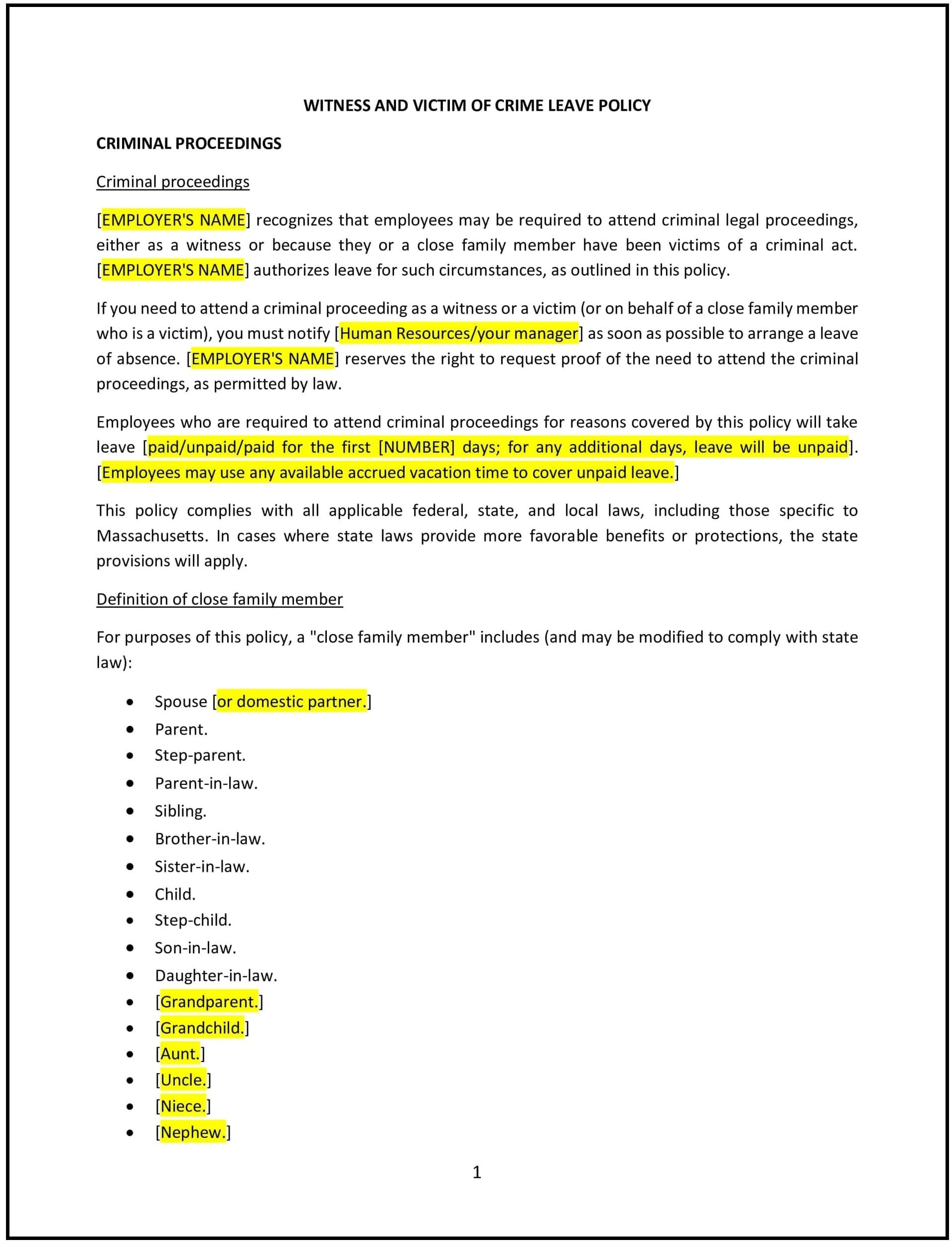Witness and victim of crime leave policy (Massachusetts): Free template
Got contracts to review? While you're here for policies, let Cobrief make contract review effortless—start your free review now.

Customize this template for free
This witness and victim of crime leave policy is designed to help Massachusetts businesses manage employee leave for those who are victims of crime or witnesses to criminal activity. The policy outlines the company’s approach to providing paid or unpaid leave for employees who need to attend court hearings, cooperate with law enforcement, or address personal legal matters as a result of being a victim or witness. The policy ensures that employees can fulfill their civic responsibilities without undue stress or financial hardship while promoting workplace safety and compliance with Massachusetts state laws.
By adopting this policy, businesses can support employees who are involved in the criminal justice process, while ensuring that workplace operations continue smoothly.
How to use this witness and victim of crime leave policy (Massachusetts)
- Define eligibility for leave: Specify which employees are eligible for leave under this policy. This may include employees who are victims of violent crimes or those who are subpoenaed to testify as witnesses in criminal cases. The policy should outline the documentation required to confirm eligibility, such as a subpoena or police report.
- Outline the types of leave available: Clarify whether the leave will be paid or unpaid, and define the maximum amount of leave employees are entitled to for attending court hearings or assisting law enforcement. The policy should distinguish between leave for attending court as a witness and leave for attending court as a victim.
- Provide guidance on the leave request process: Employees should notify their employer as soon as they are aware that they need to take leave. The policy should specify how employees should submit leave requests, how much advance notice is required, and any necessary documentation to support the request.
- Address the approval process: Define how leave requests will be reviewed and approved. The policy should ensure that managers understand the criteria for granting leave and how to handle any potential impact on work operations.
- Ensure confidentiality: The policy should specify that information about the crime or legal proceedings will be kept confidential, and that employees are not required to disclose unnecessary personal details. This ensures that employees feel safe in reporting their need for leave without fear of invasion of privacy.
- Comply with Massachusetts and federal laws: Ensure that the policy complies with Massachusetts state laws, including those that protect employees’ rights to take leave in certain situations, such as the Massachusetts Crime Victim Leave Law. The policy should also ensure that it aligns with federal regulations regarding leave for crime victims and witnesses.
- Review and update regularly: Periodically review and update the policy to ensure it remains compliant with changes in Massachusetts state laws, federal regulations, and any changes in the company’s operations or needs.
Benefits of using this witness and victim of crime leave policy (Massachusetts)
This policy offers several benefits for Massachusetts businesses:
- Supports employee rights: The policy ensures that employees who are victims or witnesses of crime have the opportunity to fulfill their legal obligations or take time to recover from the emotional impact of a crime, all while maintaining their job security.
- Promotes a supportive work environment: By offering leave for employees affected by crime, businesses demonstrate a commitment to the well-being of their employees, which can improve morale and job satisfaction.
- Reduces absenteeism: Employees who feel supported in their legal obligations are less likely to experience stress or financial hardship, which helps reduce absenteeism and promotes workplace stability.
- Aligna with Massachusetts state laws: The policy helps the business comply with Massachusetts state laws, including the Crime Victim Leave Law, which mandates that businesses provide leave to victims of certain crimes.
- Enhances employee loyalty: Offering leave for crime victims and witnesses strengthens the employer-employee relationship and increases employee loyalty, as employees feel valued and supported during difficult times.
- Mitigates legal risks: A clear and compliant policy helps businesses mitigate the risk of legal challenges or complaints related to the treatment of employees who are victims or witnesses of crime.
Tips for using this witness and victim of crime leave policy (Massachusetts)
- Communicate the policy clearly: Ensure that all employees are aware of the policy and understand their rights to take leave if they are victims or witnesses of a crime. Provide the policy in the employee handbook and review it during onboarding or team meetings.
- Encourage early notice: Encourage employees to notify their supervisor or HR as soon as they know they will need time off for court proceedings. Early notice helps ensure that the company can plan for adequate coverage during the employee’s absence.
- Respect employee privacy: Employees should not be required to disclose personal details about the crime or legal proceedings unless it is necessary for processing their leave request. Respect for privacy helps create a supportive work environment.
- Keep records of leave: Maintain records of leave taken under this policy, including the dates of leave and any supporting documentation, to ensure proper tracking and compliance.
- Provide flexibility: If an employee needs additional time off due to the nature of the crime or legal proceedings, be flexible with leave approvals. Employees may need additional support depending on the severity of the situation.
- Review and update regularly: Periodically review the policy to ensure it is compliant with Massachusetts state laws, federal regulations, and any changes in the company’s approach to employee leave or support.